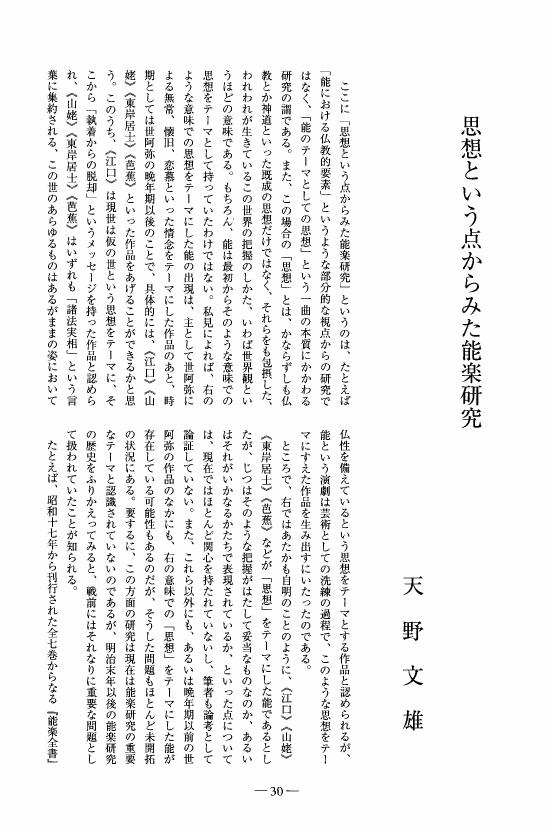21 0 0 0 OA 徳川家の初期謡初(うたいぞめ) : 永禄期を中心に
- 著者
- 天野 文雄
- 出版者
- 上田女子短期大学
- 雑誌
- 紀要 (ISSN:09114238)
- 巻号頁・発行日
- vol.7, pp.B13-B23, 1984-03-31
13 0 0 0 OA 最近の原子力発電所の安全性に関する国際会議
- 著者
- 斯波 正誼 天野 文雄
- 出版者
- 一般社団法人 日本原子力学会
- 雑誌
- 日本原子力学会誌 (ISSN:00047120)
- 巻号頁・発行日
- vol.23, no.10, pp.736-745, 1981-10-30 (Released:2009-04-21)
- 参考文献数
- 21
The report presents the summary of Stockholm Conference held on October 20-24, 1980 sponsored by IAEA, where current nuclear power plant safety issues were discussed.Some technical topics are reviewed that include (1) examining nuclear safety, (2) siting policy, (3) designing for safety, (4) operational safety, (5) emergency planning, and (6) risk assessment, small leak loss of coolant accidents.
5 0 0 0 OA 《杜若》を読み解く ――「衆生済度の我」をめぐって――
- 著者
- 天野 文雄
- 出版者
- 日本演劇学会
- 雑誌
- 演劇学論集 日本演劇学会紀要 (ISSN:13482815)
- 巻号頁・発行日
- vol.39, pp.71-85, 2001-10-20 (Released:2018-12-14)
Noh plays, even popular ones, are rarely read as drama and given correct interpretations. The present writer tries to read a noh play, Kakitsubata, as a drama and determine to whom the “I” actually refers means, when the spirit of kakitsubata (iris), that is, the spirit of Lady Nijo, utters “I as the savor of all the human beings” in the story of Ariwara no Narihira. The writer concludes, examining some secret Medieval literatures on “waka”, a traditional form of Japanese poetry, that the “I” is not the spirit of the story-teller kakitsubata, Lady Nijo, but Narihira himself.
4 0 0 0 OA 《笠間の能》をめぐる諸問題 ――大成期における将軍周辺の能という視点から――
- 著者
- 天野 文雄
- 出版者
- 日本演劇学会
- 雑誌
- 演劇学論集 日本演劇学会紀要 (ISSN:13482815)
- 巻号頁・発行日
- vol.37, pp.65-96, 1999-09-30 (Released:2019-11-11)
In the section 14 of Sarugaku dangi, one of his treatises on Noh, Zeami writes as a footnote, “Kasama no noh is not appropriate nowadays.” We may assume that this is a play called Yasu-inu, which has been excluded from the actual repertories of Noh plays. There are two questions to be answered. (1) The question whether this play was written in Zeami's days or had been done before. In other words, whether Zeami criticized a contemporary play or was against reviving the old play. (2) The question why Zeami regarded this play inappropriate at the time. The play deals with Yasu-inu, the son of a military man who revolted against the Kamakura-fu, the administrative office in Kamakura in the begining of the Muromachi Period. Kasama, the waki of the play, comes to arrest him and a fighting ensues.In the process of finding answers to these questions one also will find what the situation of the noh actors under the patronage of Shogun was; Zeami was definitely one of them. Moreover, by examining this play, one can detect important influences of other noh plays on it, and vice versa.
3 0 0 0 OA 室町期成立番外謡本の網羅的調査・系統分類と『謡曲大成』の作成
- 著者
- 竹本 幹夫 山中 玲子 小林 健二 落合 博志 大谷 節子 三宅 晶子 天野 文雄 石井 倫子 稲田 秀雄 表 きよし 樹下 文隆 西村 聡 松岡 心平 三宅 晶子
- 出版者
- 早稲田大学
- 雑誌
- 基盤研究(A)
- 巻号頁・発行日
- 2005
番外曲を中心に、カ行までの170番1020本ほどを翻刻した。また代表者・分担者・連携研究者はそれぞれ別記の論考を発表した。研究成果として発表した謡本以外にも、全国の謡本資料を博捜して、『国書総目録』未収の謡本を多数発見、デジタル化した。それらはハードディスクに複写して連携研究者以上の研究参加者がそれぞれ保管し、今後の作業のために役立てる。また竹本が監修し、分担者等の内、三宅晶子・山中玲子が中心となり、落合博志・大谷節子が補佐して編集実務に当たる形で、『現代謡曲集成』全6巻を企画し、勉誠出版より刊行の予定である。これについてはすでに第1巻が本年度中に刊行の予定で、数年以内に全巻刊行の後、別途全謡曲本文を網羅した『謡曲大成』を刊行の予定である。また分担者の内、大谷節子が、別記の著書『世阿弥の中世』により、2008年度角川源義賞を受賞したことも申し添えたい。
3 0 0 0 OA 近世の伊勢猿楽 : 新出資料にみるその動向
- 著者
- 天野文雄 アマノフミオ
- 出版者
- 大阪大学文学部
- 雑誌
- 大阪大学文学部紀要 (ISSN:04721373)
- 巻号頁・発行日
- vol.33, no.2, pp.1-107, 1993-03-10
2 0 0 0 OA 井阿弥をめぐる二,三の問題
- 著者
- 天野 文雄
- 出版者
- 法政大学国文学会
- 雑誌
- 日本文學誌要 (ISSN:02877872)
- 巻号頁・発行日
- vol.57, pp.54-69, 1998-03-24
1 0 0 0 OA 思想という点からみた能楽研究
- 著者
- 天野 文雄
- 出版者
- 中世文学会
- 雑誌
- 中世文学 (ISSN:05782376)
- 巻号頁・発行日
- vol.52, pp.30-33, 2007 (Released:2018-02-09)
1 0 0 0 OA 関屋俊彦解題 『勧進能幷狂言尽番組』
- 著者
- 天野 文雄
- 出版者
- 関西大学国文学会
- 雑誌
- 國文學 (ISSN:03898628)
- 巻号頁・発行日
- vol.77, pp.119-122, 1998-03-10
書評・関西大学図書館影印叢書 第一期第三巻
1 0 0 0 「原子力安全」調査専門委員会の活動(第2回中間報告)
1 0 0 0 OA 日本の「声の音楽」の諸相 -共通の歌詞を用いた邦・洋楽の歌唱表現法の比較の試み-
- 著者
- 中山 一郎 天野 文雄 上畠 力 河内 厚郎 小島 美子 小林 範子 杉藤 美代子 高木 浩志 柳田 益造
- 雑誌
- 情報処理学会研究報告音楽情報科学(MUS)
- 巻号頁・発行日
- vol.1998, no.14(1997-MUS-024), pp.93-100, 1998-02-13
本稿は、筆者らが遂行している、日本語の歌唱表現法に関する学際的研究の紹介である。日本語を洋楽的唱法で歌唱する場合、日本語としてのニュアンスや自然さが失われ、"何を言っているのか解らない"という深刻な事態を招いている。その克服には、古来、日本語の扱いに工夫を重ねて発展してきた伝統芸能(広義の邦楽)との歌唱表現法の比較が不可欠であると考えられるが、そのための方法論すら無い現状である。本研究は、共通の歌詞を、多数の人間国宝を含む、各ジャンルにおける最高クラスの演者に"歌い分け"を行わせ、得られた高品質の音声試料を音響分析することにより、邦楽と洋楽における歌唱表現法の普遍的な差異、及び同一性を科学的に明らかにすることを目的とする。本稿では、研究の具体的な方法論、予想される結果、及び研究の展望について述べる。
1 0 0 0 IR 今熊野猿楽の実現 : 義満台覧の背景をめぐって
- 著者
- 天野 文雄 Amano Fumio アマノ フミオ
- 出版者
- 大阪大学大学院文学研究科
- 雑誌
- 待兼山論叢. 美学篇 (ISSN:03874818)
- 巻号頁・発行日
- vol.22, pp.1-20, 1988
1 0 0 0 IR 室町後期の「翁座」の動向--住吉社御田植神事の猿楽をめぐって
- 著者
- 天野 文雄 Amano Fumio アマノ フミオ
- 出版者
- 大阪大学大学院文学研究科
- 雑誌
- 待兼山論叢 (ISSN:03874818)
- 巻号頁・発行日
- vol.24, pp.p1-21, 1990
1 0 0 0 OA 「組踊の系譜-朝薫の五番から沖縄芝居、そして『人類館』へ」
- 著者
- 与那覇 晶子 鈴木 雅恵 天野 文雄 當間 一郎 幸喜 良秀 高江洲 義寛 狩俣 恵一 板谷 徹 新城 亘 玉城 盛義 伊良波 さゆき 吉田 妙子 前田 舟子 伊野波 優美 MAZZARO Veronica
- 出版者
- 琉球大学
- 雑誌
- 基盤研究(C)
- 巻号頁・発行日
- 2009
「組踊の系譜」のプロジェクトは、琉球・沖縄芸能の近世から現代に至る通史的な大きなテーマである。2004年に開場した「国立劇場おきなわ」の劇場の形態、そして21世紀以降に創作された20作に及ぶ大城立裕氏の新作組踊まで視野に入れた研究になった。本研究の成果の一つは二回開催されたシンポジウムである。第一回「組踊から沖縄芝居、そして≪人類館≫へ」(2012年2月8日)と第二回「≪劇場と社会≫-劇場に見る組踊の系譜」(2012年3月11日)の両シンポジウムは、組踊と能楽、其々に優れた研究者當間一郎氏と天野文雄氏に基調講演をしていただき、民俗芸能、琉球舞踊、琉球音楽、シェイクスピアなどの研究者、国立劇場おきなわ芸術監督、沖縄芝居実験劇場代表等をパネラーとして招聘し開催した。一方、大城氏の10作の新作組踊上演は、朝薫が初めて冊封使に披露した1719年から現在に至る「組踊」の系譜を逆照射することになり、本研究は当初の目的を超えた発見をもたらした。
1 0 0 0 OA 「須田国太郎 能・狂言デッサン」総目録
- 著者
- 天野 文雄 アマノ フミオ
- 出版者
- 大阪大学大学院文学研究科
- 巻号頁・発行日
- 2002-03-23
大阪大学所蔵「須田国太郎 能・狂言デッサン」の総目録
1 0 0 0 民族芸能における翁舞の総合的研究
民族芸能の「翁」の意義は、それ自体の価値とともに、能の「翁」研究の資料たる点にある。その両者を兼ね備えている民族芸能の「翁」には奈良豆比古神社翁舞、兵庫県加東上鴨川住吉神社翁舞、神戸市車の大歳神社翁舞などがあるが、後の二者についてはすでに詳細な調査報告がなされているので、このたびは奈良豆比古神社の翁舞を主たる調査対象としたものである。従って、この調査の目的は次のごとくであった。(1)奈良豆比古神社翁舞の歴史と現況の把握。(2)能の「翁」および民俗芸能の「翁」の中における位置づけ。(1)については、奈良豆比古神社および同社翁講所蔵の未紹介史料の発掘があり、それらの文献をもとに聞き取り調査をも併せ行った結果、寛政以後の翁舞や翁講の動向をある程度把握することができた。また、実績報告書にも報告したように、同翁舞の現況についても、所作と音楽を中心に詳細に分析し、記録化することができた。これは平成元年時の詳細な記録として、将来その評価はきわめて高いものとなることは必至と言える。(2)については、奈良豆比古神社の翁舞は上鴨川住吉神社や神戸市大歳神社の翁舞と同系であり、江戸期に南部の薪猿楽や春日若宮おん祭において「翁」を独占的に演じていた「年預」の系譜を引く「翁」であることが判明した。年預は室町期以前の猿楽座の上座衆(翁の上演構をもつ長老座衆)の末裔であり、「翁」という芸能の伝承力の強さ、民族芸能の「翁」の位置と意義について、新たな認識が得られた。
1 0 0 0 OA 観世文庫所蔵能楽関係資料のデジタル画像化と解題目録作成に向けた総合的研究
- 著者
- 松岡 心平 天野 文雄 磯田 道史 小川 剛生 落合 博志 高桑 いづみ 高橋 悠介 竹本 幹生 橋本 朝生 姫野 敦子 宮本 圭造 山中 玲子 横山 太郎
- 出版者
- 東京大学
- 雑誌
- 基盤研究(A)
- 巻号頁・発行日
- 2006
本研究は、観世文庫が所蔵する貴重な能楽関係文献資料の調査・整理・保存・公開によって、今後の能楽研究の発展の基礎を築いた。資料はマイクロフィルムに撮影・保存したうえで、これをデジタル画像化し、文献調査に基づく書誌情報と統合してデータベース化した。これはデジタルアーカイブとしてWeb上に公開され、資料が世界中から検索・閲覧可能になった。さらに「観世家のアーカイブ展」の開催を通じて、研究によって得られた知見の普及をはかった。
1 0 0 0 中世から近世・近代にいたる都市と能楽の関係についての総合的研究
本研究は、能楽が現代にいたるまでの問に全国各地でどのように成長・発展したかを具体的に跡づけ地方能楽史の体系的な位置づけを行うことを最終的な目標として、(1)全国の地方諸藩の能楽資料の残存状況を調査し、(2)藩政日記中の演能記事、演出資料、演能記録等を可能な限り収集・整理し、(3)地方各都市における能楽の浸透の程度や演能の際の経済的基盤、役者確保の方法、技法の伝播の仕方など、様々な問題を具体的な資料によって跡づける作業を行ってきた。その結果、資料収集の面では、予想通り各藩の藩政日記は能楽資料の宝庫であることが確認され、特に東北・北陸諸藩を中心に撮影・収集が進んだ。が、逆に、量があまりにも厖大なため、これらの大藩や江戸・京・大坂といった大都市の状況については全体を俯瞰する論をまとめるまでに至らず、基礎資料としての能楽関係記事年表や、個々の役者に関する考察等、一側面を切り取った論考を掲載することになった。一方、比較的資料が限られた小藩に関しては、調査・考察が行き届き、複数の都市について、まとまった研究成果を挙げることができた。その結果、江戸時代には大都市のみならず、地方の小都市においても、それなりに能楽への取り組みが行われていたこと、能の演じ手を確保するために他藩の役者に協力を仰いだり素人の教育を任せたりするシステムや、地方在住役者間のネットワークのようなものができていたことも、新たに判明した。この他、名古屋の笛方役者、藤田六郎兵衛家蔵の能楽文書悉皆調査と撮影も、本研究の成果の一つであるが、これについては別途資料目録を作成すべく、準備中である。

